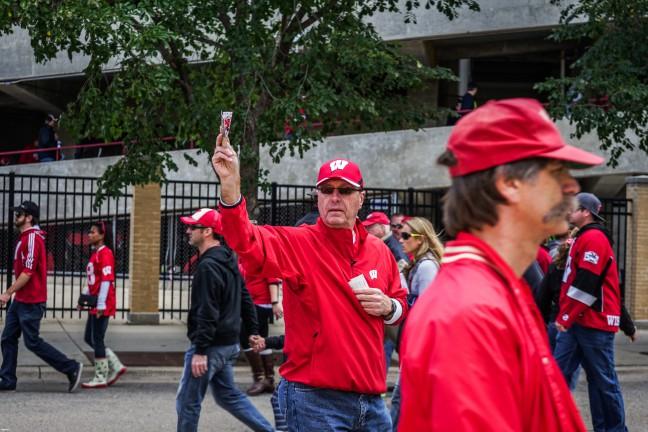The University of Wisconsin athletic department is transitioning to a fully digital ticketing system this year — starting with football and volleyball games.
They announced the new policy in August in an effort to make the ticket admission process contactless while the COVID-19 Delta Variant spreads.
Fans can only access their tickets by downloading them onto their cellphones or by printing them out before the game. The athletic office website says the digital tickets “reduce the risk of lost, stolen, counterfeit or forgotten tickets” and gives fans “quick and easy access to athletic venues.”
The new system also makes managing tickets — like selling or transferring them to other people — more convenient. Ticket holders get instant access to the tickets when they become available. They can also directly sell them on ticket resale company Stubhub.com or transfer them to someone else via an email or phone number.
People don’t need to wait in long lines at the ticket office anymore or meet up with strangers to get their tickets. This eliminates both the hassle of buying tickets and the physical safety risk of making an in-person financial transaction with a stranger.
But this digital format shifts the risk of a resale market to online scammers who benefit from not having to turn over their tickets to buyers in person. The UW Badger Student Ticket Exchange Facebook Group, a public page with 67.5k members, has seen an influx of scammers posing as people with football tickets to rip off buyers.
The group admins recently pinned posts at the top of the Facebook page warning of potential scammers. One lists the common signs of a scammer, like them having “no friends or no friends from UW-Madison” or an “identity mismatch between their profile name and payment method or email.”
Another says to avoid using Venmo to pay a seller, as scammers often use this payment method because it doesn’t have strict refund policies.
Many students have interacted with scammers on the group page. UW sophomore Mollie Tankenoff said she was scammed out of tickets for the Wisconsin versus Notre Dame game in Chicago.
“I messaged this girl named Chloe who said she had tickets available and she wanted me to pay through Apple Pay instead of Venmo,” Tankenoff said. “They kept talking about how their boyfriend was misplacing the money and then I knew it was a scam.”
Other students have found scammers are often too open and available to sell their tickets. The student football tickets are in high demand this year, meaning those actually selling tickets usually won’t be desperate to find buyers.
UW junior Lilly Boyd said scammers are almost too willing to give up their tickets in price negotiations. She added they are often sloppy when trying to prove they have tickets.
“Usually [the scammers] would take whatever I offered, like one person was willing to take $250 for the entire season pass, which was suspicious,” Boyd said. “And then they wouldn’t have proof of tickets or if they did, it was really poorly photoshopped.”
While the university isn’t responsible for ticket security in a second hand resale market, these scams are more common with only digital tickets. Scammers can easily repost fake information or edited images to draw students into paying them online before disappearing.
This situation reflects a broader issue with scammers taking advantage of college students during the pandemic when everything moved to an online format. Online security is becoming a real threat to every UW student.
UW Police recently warned of a “massive uptick” in the number of scam emails directed at students. These schemes include offering job opportunities and a first paycheck, while others claim law enforcement has a warrant out for a student’s arrest.
UW was smart to make all tickets digital. The change makes life easier for most students and ticket owners, but also opens the door to more online scamming in the resale market that used to be less problematic with physical tickets.
The UW athletic department therefore has more responsibility than just getting tickets securely to buyers. They should create a university-protected resale group, where members have to verify their connection to the university and prove they actually own tickets.
These baseline requirements wouldn’t end the issues with scammers entirely — people could still choose to take buyers’ money and run — but it would make this situation far less common. At the very least, UW should create a comprehensive guide to avoid scammers in resale markets and recommend tactics like looking a seller up in the student directory.
UW knows a massive ticket resale market exists. But they’re relying on platforms with relaxed community guidelines like Facebook or PayPal to regulate this market, allowing scammers to take advantage of students. It’s time for the UW to step in.


